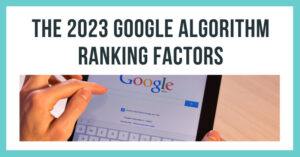A new year and a continuously advancing algorithm.
There’s no stopping the conjoined advancement of technology and digital marketing trends.
In the likes of Google, their algorithm is ever-evolving, ever-changing to cater to the needs of its users while giving them the best experience– now that’s a noble mission for Google!
Let us explore the latest updates on Google’s Algorithm ranking factor and what’s in store for us for 2023.
How does Google's SEO algorithm work?
Before anything else, let us have a refresher on what a Google Search Algorithm is.
A Google Search Algorithm pertains to ranking content by considering ranking factors such as relevance and content quality, as it matches a particular search query. It is split into three stages: crawling, indexing, and serving.
Google’s algorithm is a complex process, and no one knows exactly how it works. It is safely kept in their annals to prevent outsiders from sabotaging the system.
However, Google provides its stakeholders with the information to increase their ranking in the search results.
Without further ado, let us dive deep into the algorithm ranking factors below.
What factors affect Google ranking?
As mentioned earlier, hundreds of factors that affect Google’s ranking, but we will cover the relevant ones you can immediately take action on.
But first, let us refresh your memory on what a Google ranking factor is.
Ranking factors are a set of criteria applied by Google or any other search engine as bases for evaluation to aid in the decision-making process of arranging relevant results to return a search query.
The ultimate goal for Google is to provide a positive online experience among its users by giving them optimal content that answers their search requests.
Tempting as it is to optimize every single ranking factor, it is impossible to perfect all of it from Google’s perspective. Thus, prioritization is critical to move higher on the search engine results page.
To help you, we’ve shortlisted the most important ranking factors to improve your site’s rank in search results.
1. High-quality content
Content is still king. Its consistent #1 rank in the Google Algorithm factors, accounting for 24%, only shows how it can hugely impact your site’s ranking.
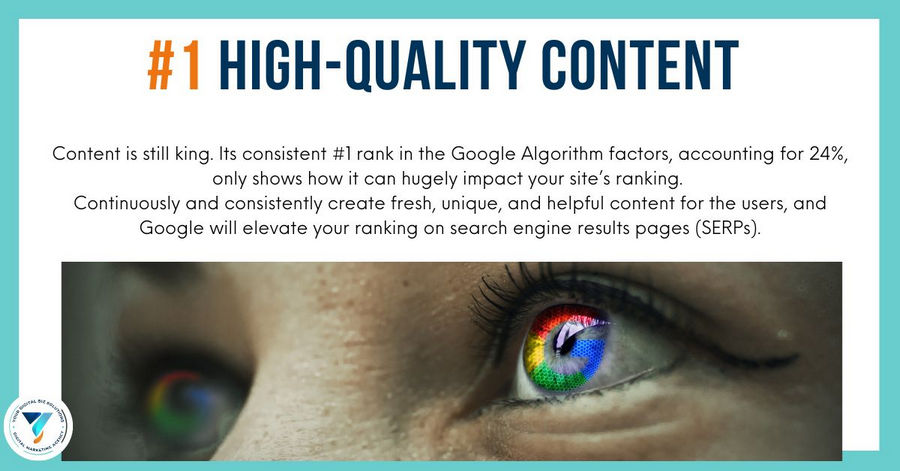
Continuously and consistently create fresh, unique, and helpful content for the users, and Google will elevate your ranking on search engine results pages (SERPs).
Google is meticulous about your content quality which means no matter how well-optimized your page is, if your content does not add value to its users, you can’t expect to move higher in the rankings.
Keep in mind that Google measures content quality through these criteria:
(a) Unique and valuable content
(b) timely and fresh content
(c) content length
(d) structure and organization.
Let us go through these elements, one by one:
Content Length
Content length significantly impacts your ranking on the search results page. On average, the first 10 spots on the SERPs have a length of 1,890 words.
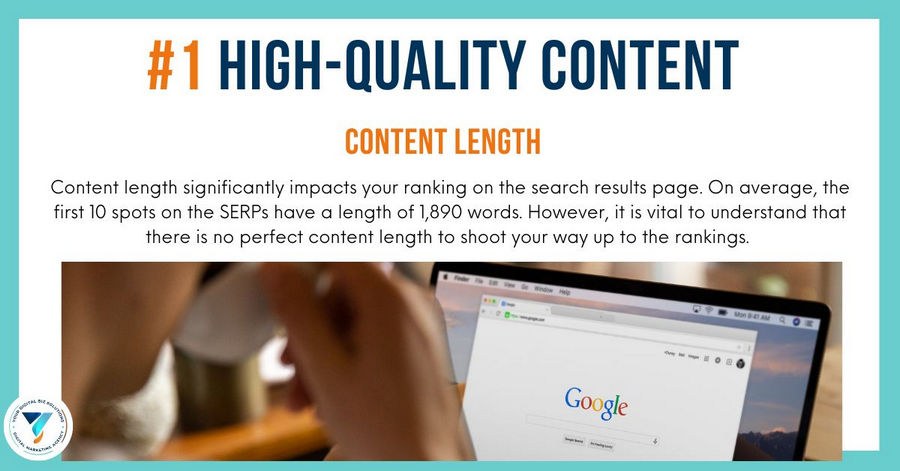
However, it is vital to understand that there is no perfect content length to shoot your way up to the rankings.
As long as you create in-depth content, cover the topic, and fully respond to the user’s needs, then you are well on your way to elevating your ranking on Google.
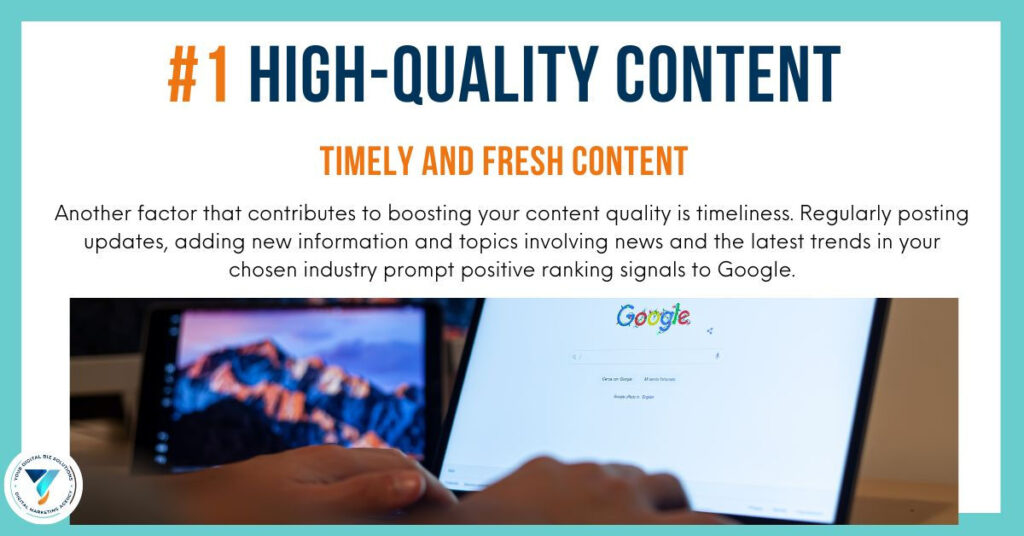
Timely and Fresh Content
Another factor that contributes to boosting your content quality is timeliness. Regularly posting updates, adding new information and topics involving news and the latest trends in your chosen industry prompt positive ranking signals to Google.
Expert tip: Use Google Trends to find the latest updates on your niche.
Structure and Organization
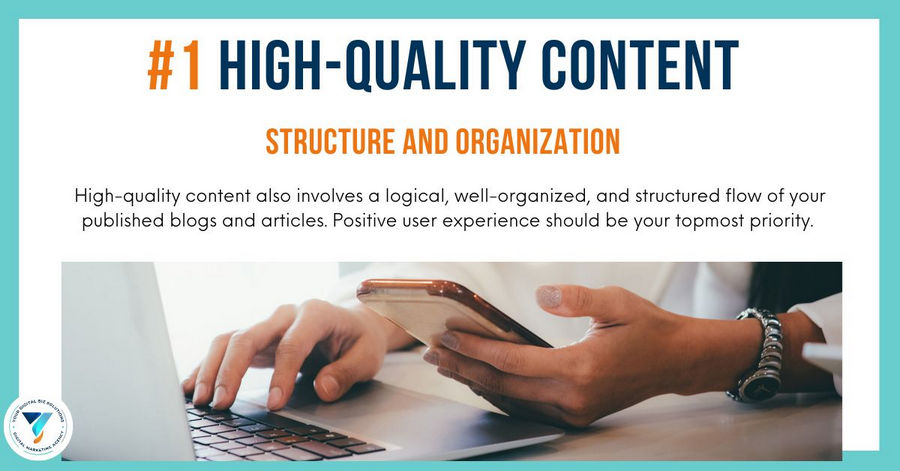
High-quality content also involves a logical, well-organized, and structured flow of your published blogs and articles. Positive user experience should be your topmost priority.
To achieve this, use headings and subheadings (H2, H3, H4, H5, and so on), bullet points, or numbered lists to increase readability.
2. Trustworthiness
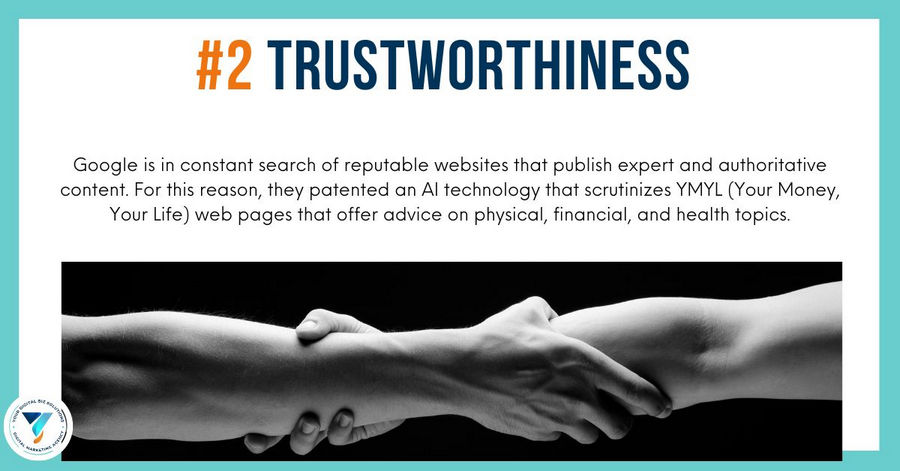
Trustworthiness is the newest addition to Google’s algorithm. It comprises 5% in the entirety of the Google ranking factors.
Google is in constant search of reputable websites that publish expert and authoritative content. For this reason, they patented an AI technology that scrutinizes YMYL (Your Money, Your Life) web pages that offer advice on physical, financial, and health topics.
Consequently, to adapt to this innovation, citing factual or academic resources and avoiding unproven claims is imperative to optimize this ranking factor.
3. Niche Expertise
Niche expertise displayed a slight increase from 13% to 14%. This increment underscores the relevance of Hub and Spoke SEO.
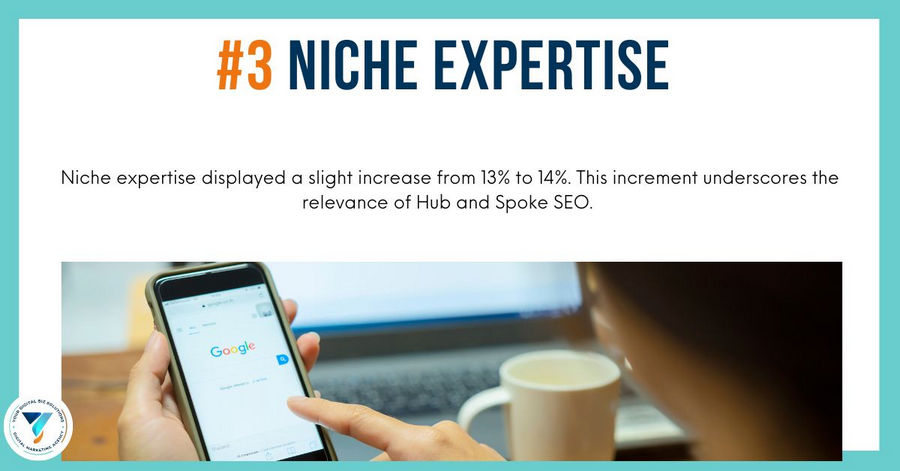
In a simpler concept, Hub and Spoke SEO is a unique way of building content around a broad topic. It’s an excellent method to edify relevance and authority around a topic.
It also helps increase your keyword ranking, website traffic, and metrics such as leads, conversions, and sales.
4. Consistent Publishing and User Engagement
This ranking factor accounts for 24% in the criteria of search engine ranking.
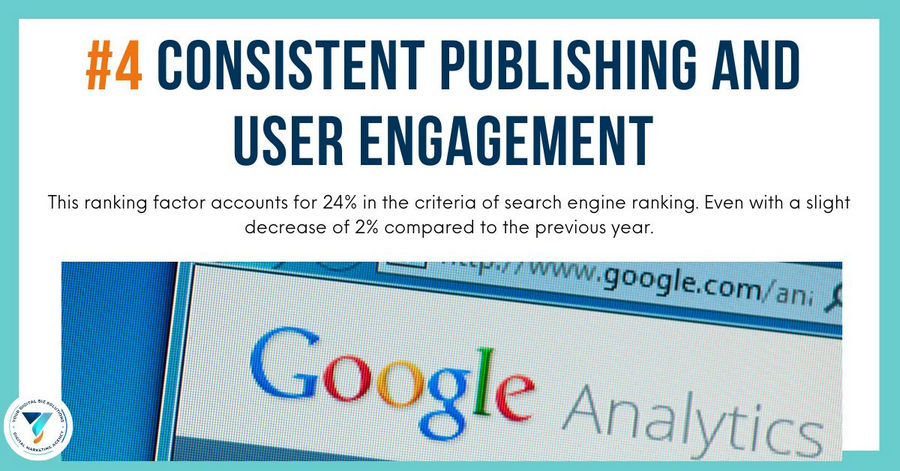
24% in the criteria of search engine ranking. Even with a slight decrease of 2% compared to the previous year, Google continues to reward consistent publishers of high-quality content by awarding them quicker indexing and higher rankings.
5. Keywords in Meta Titles
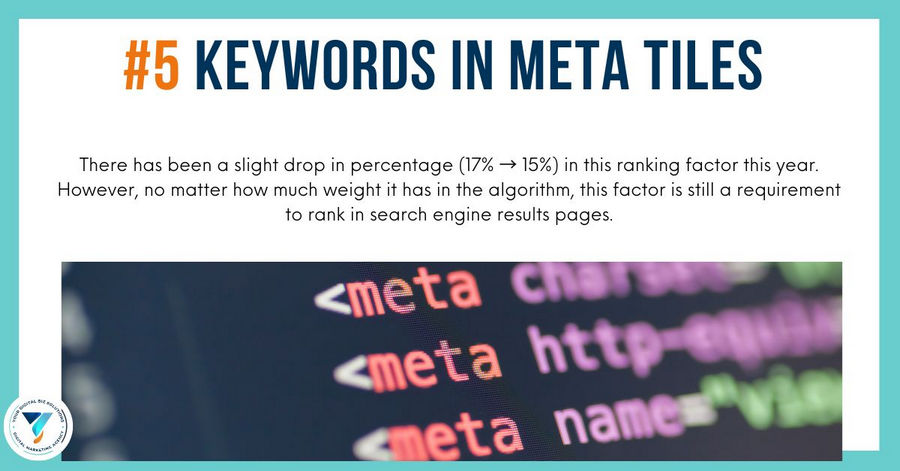
There has been a slight drop in percentage (17% → 15%) in this ranking factor this year. However, no matter how much weight it has in the algorithm, this factor is still a requirement to rank in search engine results pages.
6. Backlinks
The fourth heaviest algorithm factor maintains its share of the entirety at 15%.

Backlinks, also called inbound links, are like a vote of trust for your website. Google looks at the number of votes you get and how good your links are.
Overall, backlinks from highly authoritative sites are more valuable and will help your rankings more than those with lower authority. When you get these links, Google knows that your content is reliable because other high-quality sites are vouching for it.
7. Site Speed
Positive user experience is the topmost priority for Google. Their main goal is to produce relevant search results whenever users input their queries.
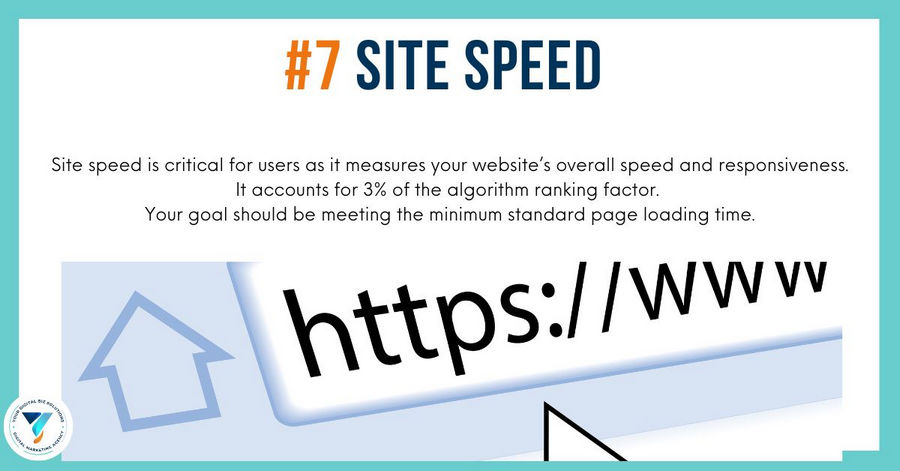
Site speed is critical for users as it measures your website’s overall speed and responsiveness. It accounts for 3% of the algorithm ranking factor.
Your goal should be meeting the minimum standard page loading time.
8. Website Security
Along with your site structure, security is now a major factor in how Google ranks your website.

Ensure your site uses HTTPS protocol because it encrypts the data between your site and a user’s browser.
9. Website Structure
From a crawling and indexing perspective, a website’s structure is critical for a newly published site.
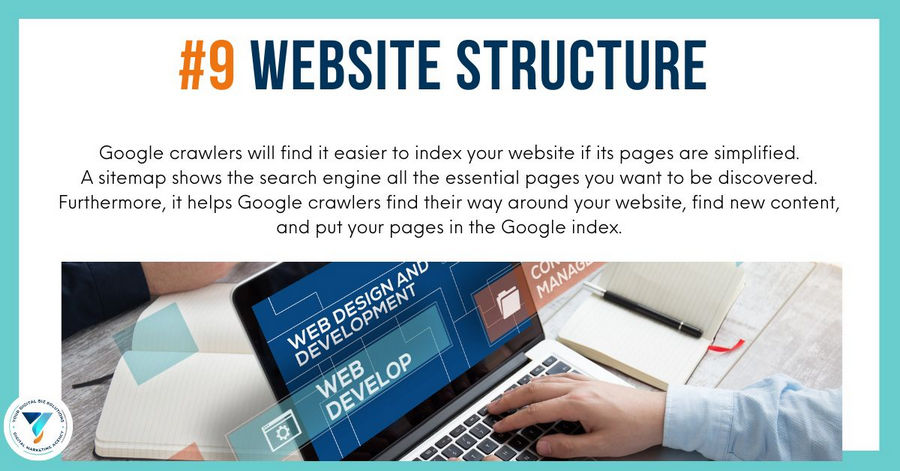
Google crawlers will find it easier to index your website if its pages are simplified.
Start by making a sitemap in WordPress to speed up new and updated content indexing.
A sitemap shows the search engine all the essential pages you want to be discovered. Furthermore, it helps Google crawlers find their way around your website, find new content, and put your pages in the Google index.
10. Keywords in URL
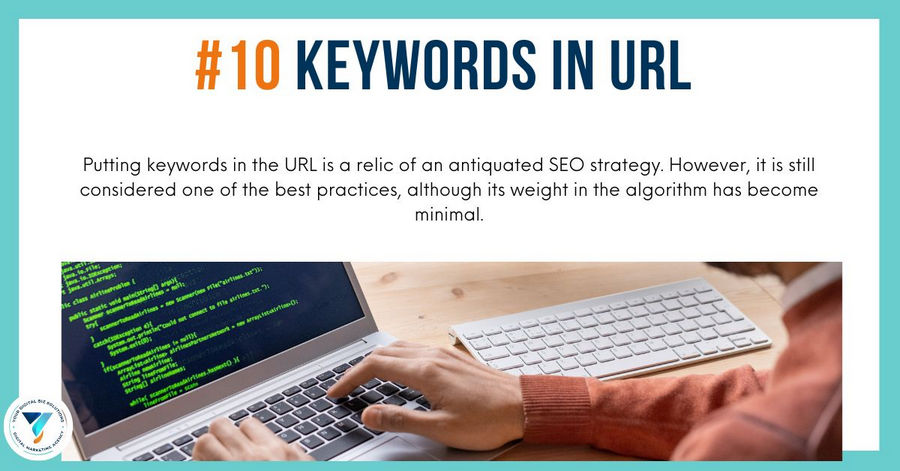
Putting keywords in the URL is a relic of an antiquated SEO strategy. However, it is still considered one of the best practices, although its weight in the algorithm has become minimal.
11. Mobile Friendliness
In 2019, Google emphasized the importance of your website performance on different screen sizes. They have reached this implementation because of the billions of mobile users worldwide.
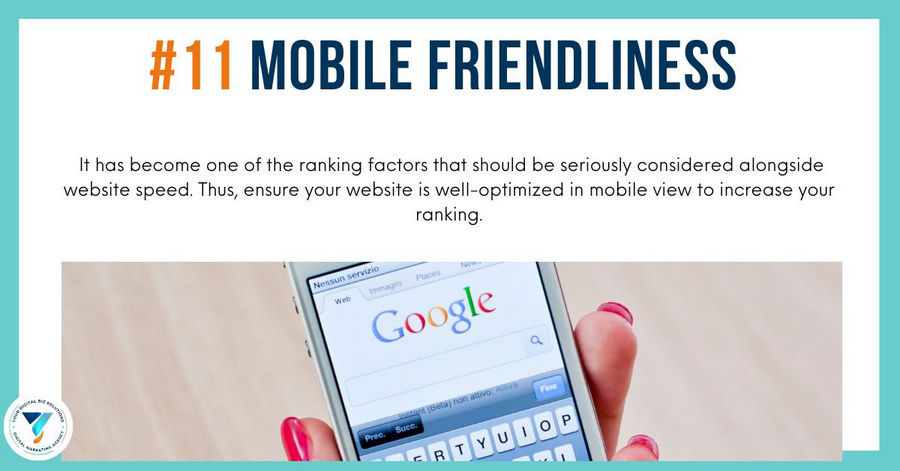
Now, it has become one of the ranking factors that should be seriously considered alongside website speed. Thus, ensure your website is well-optimized in mobile view to increase your ranking.
12. Keywords in Meta Description Tags
Aside from producing high-quality content, ensure that your website is keyword optimized.

Keywords should match what people type into search engines when they want to find something. Ensure that your web pages contain the keywords your target audience is looking for and match their search intent.
This way, Google can find your page and present it when people perform a search.
How will this year’s algorithm changes affect your 2023 SEO strategy?
This 2023, consider these ranking factors in your overall digital and content marketing strategy: Keywords in meta-titles, trustworthiness, mobile-friendliness, and website speed.
Keywords in Meta Titles
Since the late 1990s, inserting target keywords into the meta title tag has been crucial to ranking in search results.
Furthermore, it is vital to consider where and how many keywords should be placed within the title tag.
In an ideal world, your title tag would only include the keyword you want to rank for, but adding articles and adjectives around it increases readability.
Trustworthiness
Lorem ipsum dolor sit amet, consectetur adipiscing elit. Ut elit tellus, luctus nec ullamcorper mattis, pulvinar dapibus leo.
In the past few years, Google has become more conscientious about ensuring published content does not mislead or misinform users. Its efforts include updating the Your Money, Your Life algorithm and getting a patent with IBM on how to find facts in a document.
To properly optimize your content for this new factor, ensure it doesn’t contain false claims. It should include citations from academic, government, or other credible resources.
Mobile-First Website
To increase your site visits this 2023, ensure that your website is easy to use on phones and tablets.
“Mobile-friendliness” is now “mobile-first“, which means that your website should be designed with mobile visitors in mind.
Ideally, your website shouldn’t have a desktop version at all. The site should look the same on a mobile device as on a computer. The layout should be simple, and the navigation should be set up for the best mobile user experience.”Mobile-friendliness” is now “mobile-first“, which means that your website should be designed with mobile visitors in mind.
Page Speed
Ensure that your pages load as quickly as possible.
Keep in mind that your site loses its ability to rank with each second it takes to load or if it eventually fails to load. Use Google’s free PageSpeed Insights tool to check how fast your page loads.
Optimizing your site with these ranking factors will only increase your ranking as much as each factor’s weight in the entirety of the algorithm. However, ensure that you stay within the minimum threshold, as Google will penalize your site.
Looking for a team of SEO experts to optimize your website and increase your ranking? Schedule a free discovery call with us today!






